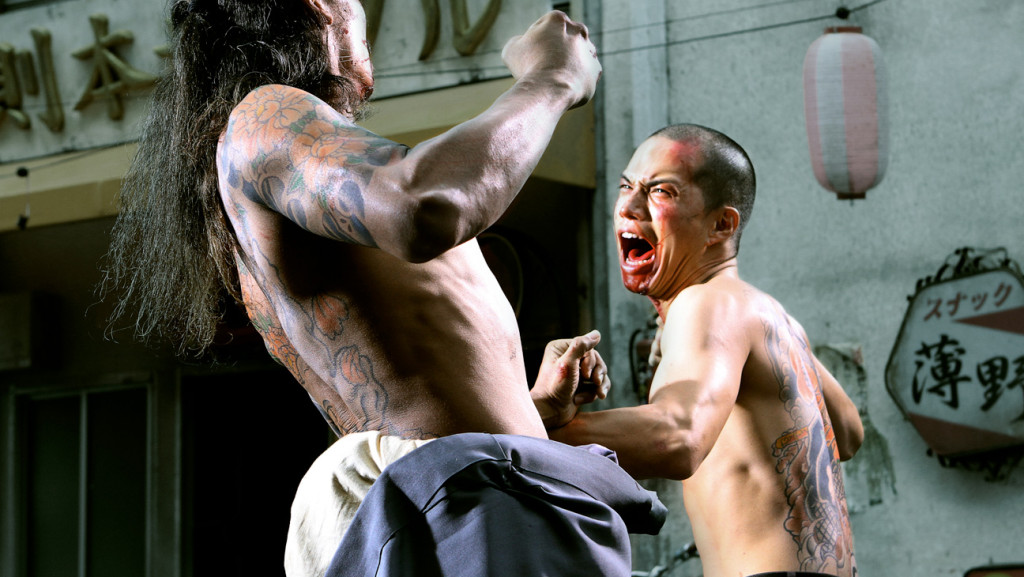Cannes: Yakuza Apocalypse review
 Kageyama (Hayato Ichihara) made it his mission to become a yakuza following an encounter in a bath house with a charismatic yakuza boss named Kamiura, played by the wonderful Riri Furanki. But the way of the yakuza, and particularly so in the gleefully imagined reality of director Takashi Miike and screenwriter Yoshitaka Yamaguchi, is not an easy one.
Kageyama (Hayato Ichihara) made it his mission to become a yakuza following an encounter in a bath house with a charismatic yakuza boss named Kamiura, played by the wonderful Riri Furanki. But the way of the yakuza, and particularly so in the gleefully imagined reality of director Takashi Miike and screenwriter Yoshitaka Yamaguchi, is not an easy one.
First of all, Kageyama’s boss Kamiura gets killed and decapitated by a guy with a coffin on his back and a skilled martial artist who dresses as an otaku, played by The Raid and The Raid 2’s Yayan Ruhian. To top that off, it turns out Kamiura was a vampire all along and moments before dying, his decapitated head bites Kageyama’s neck and turns him into a yakuza vampire.
When Kamiura was in charge there was sense of respect from all of the town’s residents, who seemed to look up to the boss despite the fact that his protection racket was taking money out of their pockets. This begins the film’s central metaphor, which becomes so blunt that it’s like a breeze block. But like a breeze block, being hit with it will knock you off your feet.
So Kamiura was sucking the blood out of the town, but with a balance that satisfied him without causing alarm. Thus he was able to continue his parasitic life, leeching off the “civilians.” Any economic comparison is flat out text, no ‘sub’ about it, and one character even explicitly mentions how difficult things have gotten since the recession.
But Miike and Yamaguchi aren’t about to let a big, broad metaphor get in the way of their fun, and as a result, the film’s ideas and messages don’t entirely add up. But they were never the primary concern anyway, and Yakuza Apocalypse offers up an incredible smorgasbord of wild humour, piling sequence upon sequence of unexpected delight. Miike’s attitude towards crazy ideas seems to be that the more there are, the merrier.
Yakuza Apocalypse also features a number of action sequences that on the surface may seem somewhat silly, thanks to the inclusion of a frog mascot suit and an axe wielding kid with vampiric super powers, but Miike actually directs the action with a great deal of technical skill. The athleticism of Ichihara and Ruhian is particularly well displayed by Miike and cinematographer Hajime Kanda’s approach to framing and the way in which they move the camera to keep track on the frenetic activity.
Things are cranked up to ridiculous dimensions by a sound mix that makes punches and the swinging of blades sound like bulls running into concrete walls or hurricanes whirling Yakuza Apocalypse is not about subtlety in execution, being heightened in every respect for a consistent, effective whole.
Editor Kenji Yamashita, who has worked with Miike a number of times, has cut Yakuza Apocalypse with extraordinary precision, which you might not have expected given the generally off the wall sensibility. Miike and co. may be wild and even a bit daft creatively but were are deadly serious about this film’s execution.
That said, whilst Yamashita and Miike make a great team when it comes to stitching together shots, they do again show the same pacing problem as in a number of their previous pictures. Yakuza Apocalypse really sags in places, and seems desperately in need of a leaner overall edit.
And yet I feel like I’d miss any and every scene had it been cut out. Every time we go to a new sequence in this film there’s a new exciting, addition, promising either a good laugh or some jaw-slackening surprise. A prime is example is the eventual reveal of what is inside the frog suit, which had me laughing so hard I missed some dialogue.
Yakuza Apocalypse is destined for a good deal of attention in the West, I’m sure, thanks to its absurd humour and wild action; distributors over here have always seemed more comfortable with Miike films like Ichi the Killer than sombre fare such as The Bird People in China.
Yakuza Apocalypse is more evidence that Miike may be an actual, genuine mad genius with an unlimited well of ideas, and proof that cinema would be a far less interesting place without him.